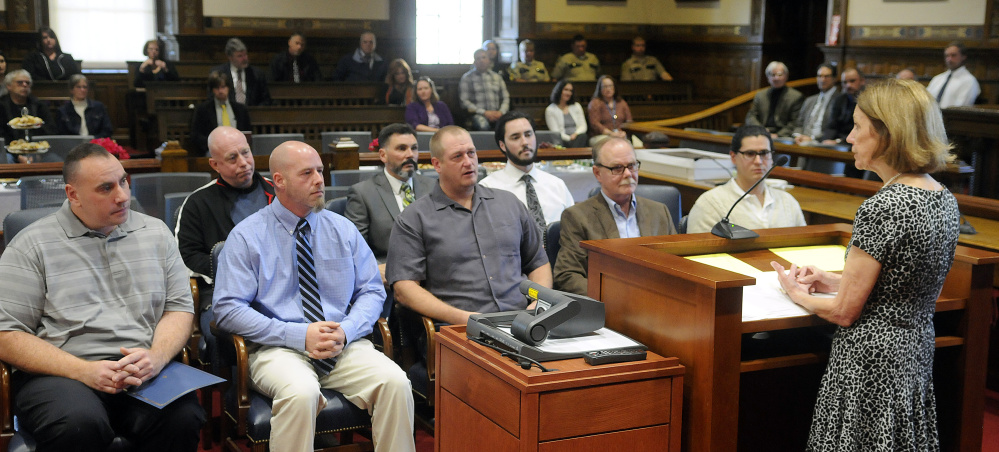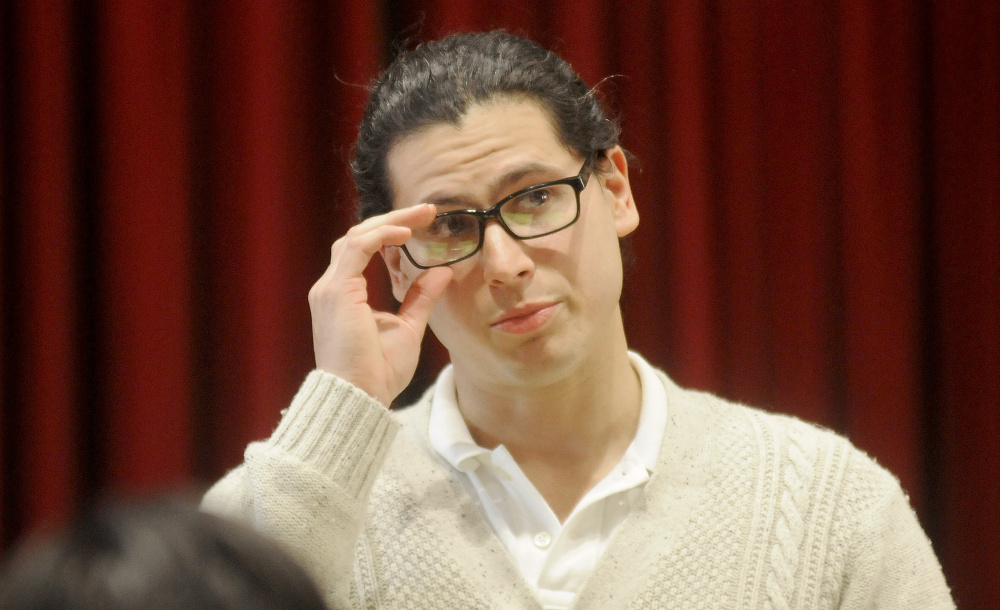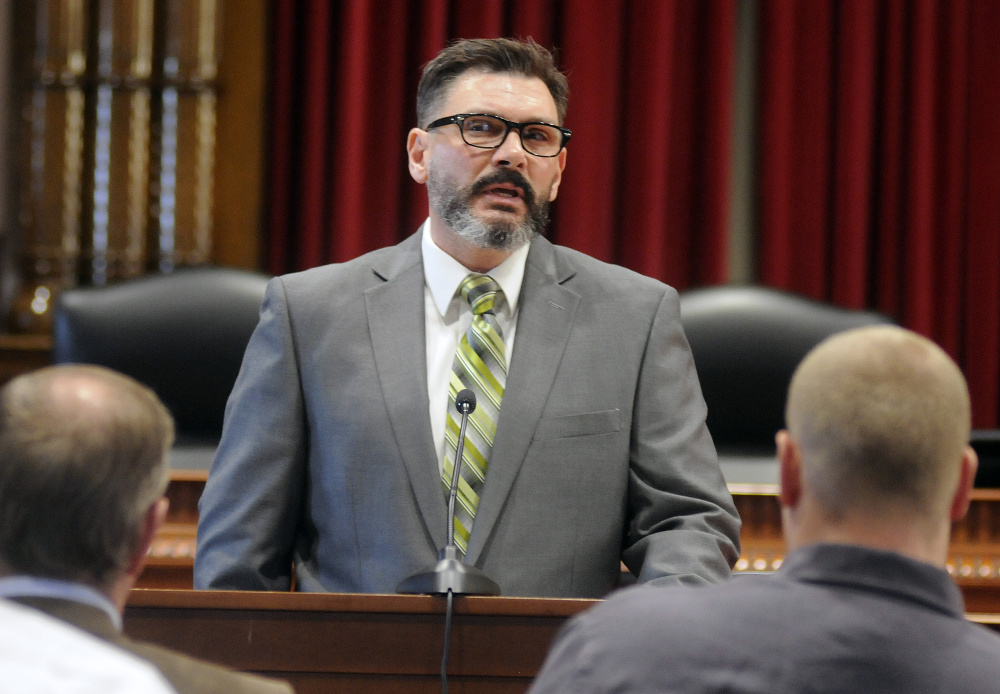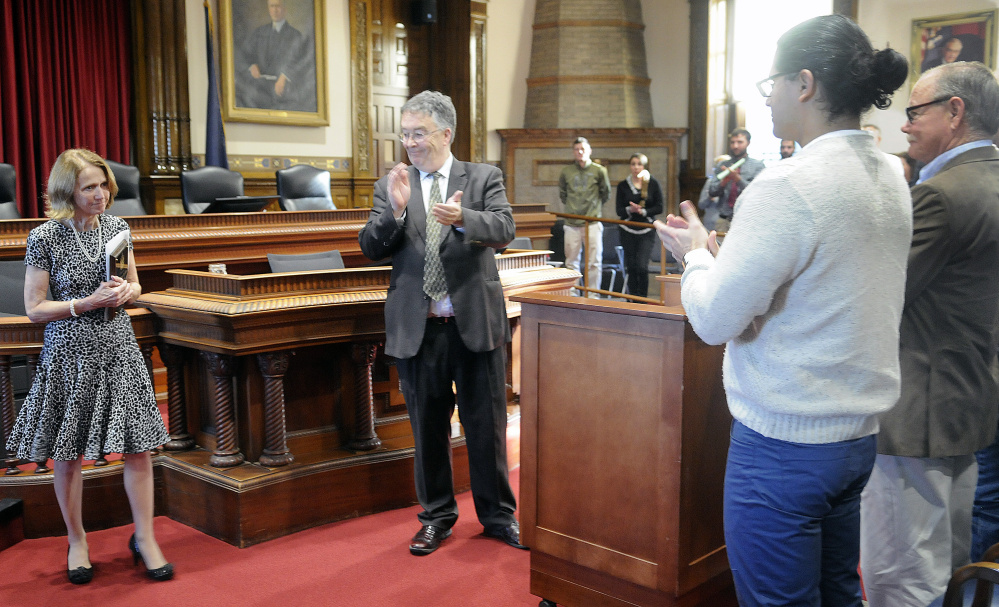For those who graduated from Kennebec County’s Co-Occuring Disorders and Veterans Court on Monday afternoon, the event was as much a celebration of their own achievements as an opportunity to thank Justice Nancy Mills, the woman who started the program 11 years ago and presided over it until recently.
“I’ve come very far, and I’m really surprised at how far I’ve come; and if I had to narrow it down to one person who I owe this to, it’s Justice Mills,” said Eric Banrevy, a 30-year-old Marine Corps veteran who graduated this week after getting convicted of armed robbery several years ago.
“Her determination and unyielding dedication to the recovery of veterans is second to none,” continued Banrevy, who is studying physics and engineering at the University of Southern Maine. “She has had my back since the day I met her. She always came through, and she’s extremely dependable and reliable.”
The Co-Occuring Disorders and Veterans Court — the only program of its kind in the state — is for veterans and adults with substance abuse problems or mental illness who have been convicted of felony charges or other serious charges, or have violated probation, according to the program’s website.
It allows them to avoid jail or prison by regularly meeting with a judge and a case manager for at least a year while also undergoing drug and alcohol testing and participating in outpatient treatment. Just eight of the program’s fall graduates attended the ceremony Monday at the Capital Judicial Center. But Justice Evert Fowle, who now presides over the court, said the names of all who graduated — close to 20 in total — and praised each of their accomplishments.
“The people we honor and recognize today are doing very well and they have completed the very rigorous (program),” Fowle said. “Most participants continue to make progress and have done far better (than they would with) the traditional approach to criminal justice, which oftentimes is to lock people up.”
“Some offenders opt for jail instead, finding that to be easier,” Fowle added.
The recidivism rate for the program’s graduates — that is, how many go on to commit another crime — is close to zero, Fowle said.
Maeghan Maloney, district attorney for Kennebec and Somerset counties, also spoke at the ceremony and credited those graduates who have found their own ways to give back to the community, whether by mentoring other court participants or rallying support for the program when state lawmakers considered cutting its funding.
“The people who graduate from this program, they not only have a close-to-zero recidivism rate, but they become the superheroes of our community,” Maloney said.
Maloney and Fowle spoke of the need to keep people out of prisons, both because it is expensive for taxpayers to house an inmate and because inmates leaving prison are more likely to re-offend. Several graduates spoke during the ceremony and reciprocated the praise.
One of them, Bennett Tisdale, 47, said that it’s important for the state to continue offering a program such as the Co-Occuring Disorders and Veterans Court. Tisdale, a Waterville barber, said he has struggled with alcoholism and entered the program after a drunken driving offense.
“As I reflect on my time in the program, I can’t remember a time when I was treated with disrespect,” he said. “I was encouraged and complimented for my accomplishments. I will forever be grateful to those in this room who believed in me when I didn’t believe in myself. I can say firsthand this program changes lives.”
Fowle and a number of the program’s participants expressed their gratitude to the caseworkers, attorneys, officers, judges and mentors who have run the program. Fowle singled out several people for awards, including Mills, the program’s founder.
Toward the end of the ceremony, Mills received a standing ovation before offering her own assessment of the program’s value. The program first started in Kennebec County Superior Court in 2005 as the Co-Occuring Disorders Court. In 2011, it was renamed the Co-Occurring Disorders and Veterans Court.
“Nobody signs up for addiction or mental illness or PTSD (post-traumatic stress disorder),” Mills said. “These are diseases, and they have to be treated compassionately and competently. They cannot be something we punish. If we treat (people with them) fairly and compassionately, we give them back their lives, their husbands and wives, their fathers and mothers, their sons and daughters, and we give to the community a productive and healthy member of society.”
“It’s socially responsible; it’s fiscally responsible,” Mills said. “It has to be the way of the future. We can do a better job in Maine with people who need our help and deserve our help. To the graduates, you have my profound respect.”
Charles Eichacker — 621-5642
Twitter: @ceichacker
Send questions/comments to the editors.







Success. Please wait for the page to reload. If the page does not reload within 5 seconds, please refresh the page.
Enter your email and password to access comments.
Hi, to comment on stories you must . This profile is in addition to your subscription and website login.
Already have a commenting profile? .
Invalid username/password.
Please check your email to confirm and complete your registration.
Only subscribers are eligible to post comments. Please subscribe or login first for digital access. Here’s why.
Use the form below to reset your password. When you've submitted your account email, we will send an email with a reset code.